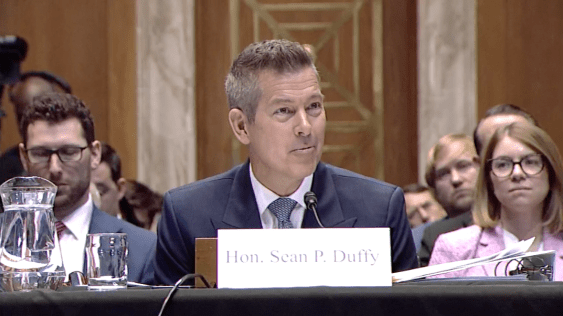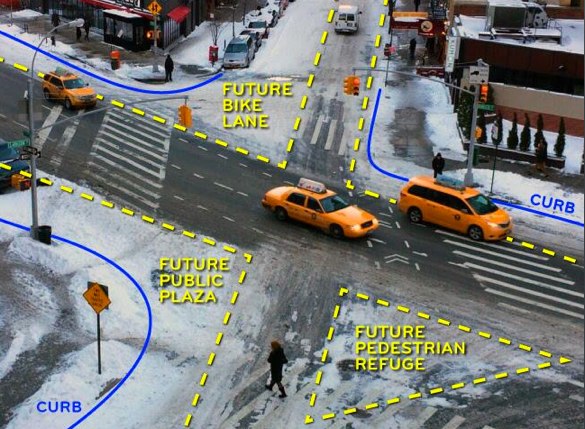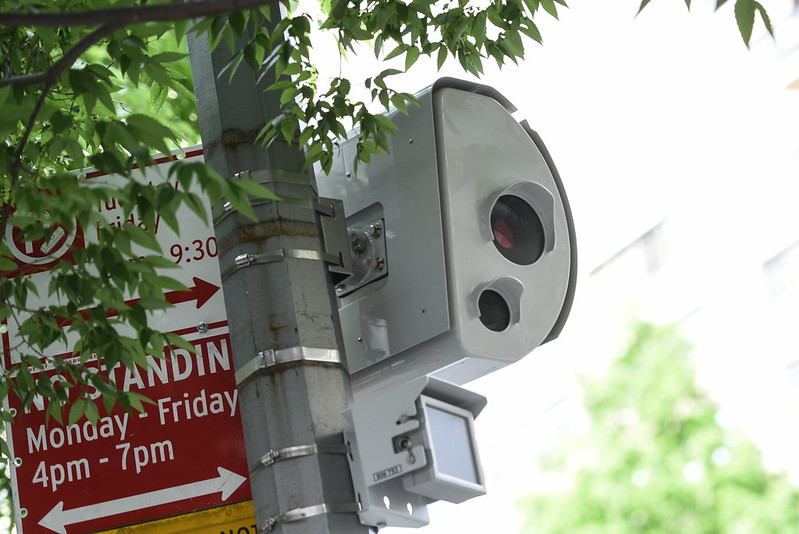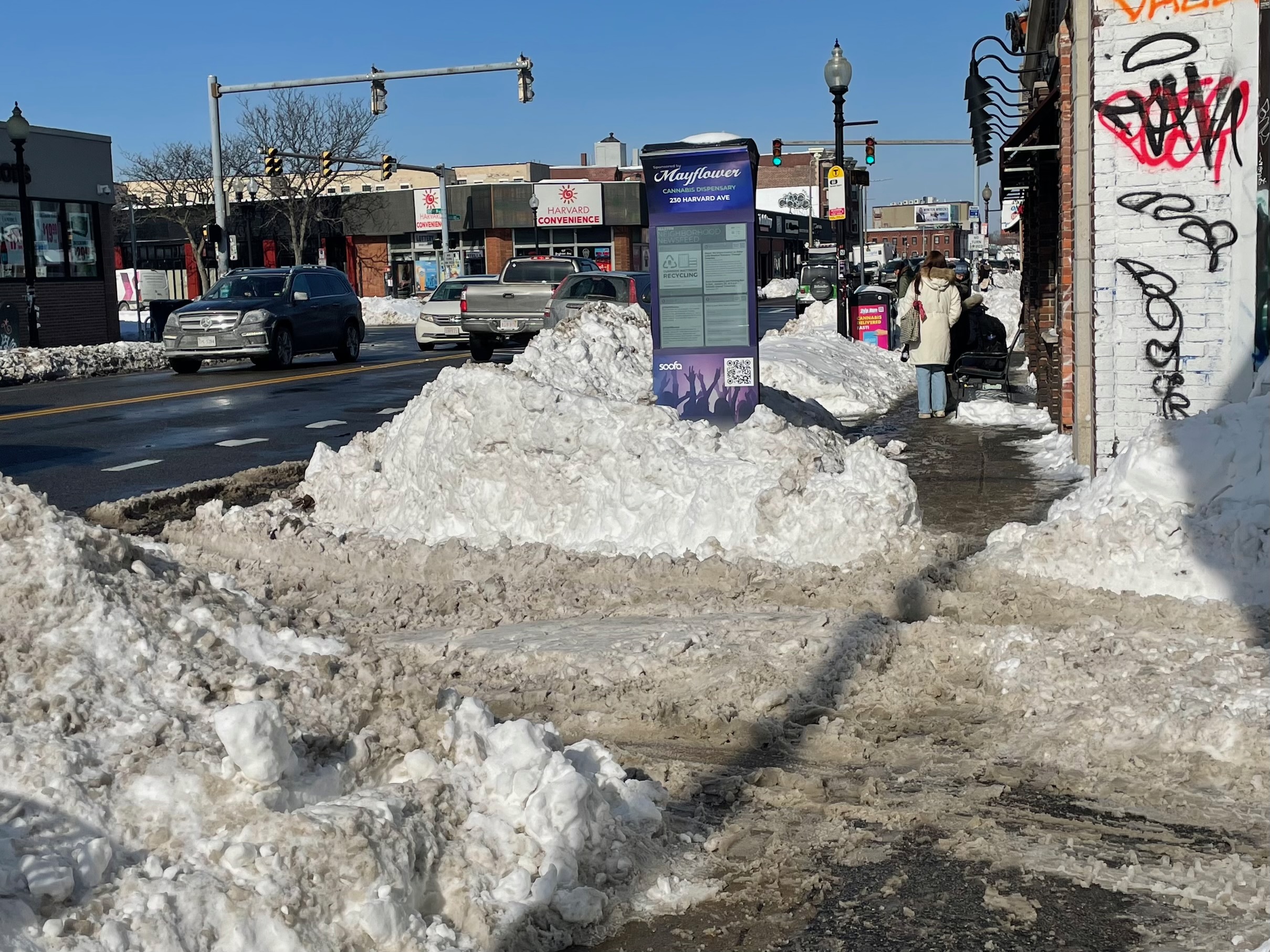Since 2020, the MBTA has relied on a huge infusion of federal pandemic-relief funding to make up the difference between its rising operating costs and lower fare revenue.
But that federal assistance is about to run out, and the T needs an infusion of roughly $700 million from Massachusetts lawmakers in order to avoid massive service cuts in 2025.
The budget gap is equal to roughly one-quarter of the T's entire operating budget. To put the problem in perspective, imagine trying to balance your household budget after a 25 percent pay cut.
And these budget shortfalls are expected to keep growing even bigger, because the T's expenses – especially labor costs – are growing faster than its revenues.
The most recent forecasts from the T's financial team indicate that the shortfall could approach $1 billion a year by the end of this decade:
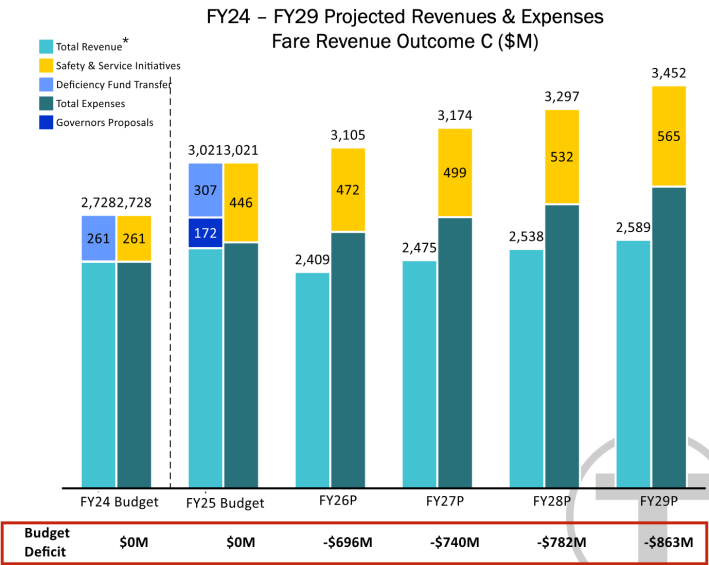
How we got here
The MBTA's Chief Financial Officer, Mary Ann O'Hara, and its Treasurer, Pat Landers, presented a history lesson on the MBTA's finances at the August 22 board meeting.
The short version of that history is this:
- Like every transportation system, the T relies on public subsidies to operate.
- But the Commonwealth's financial support for the T has been steadily eroding for the past quarter-century, and the T has run out of gimmicks to try and patch over the growing gaps between what the state's politicians offer and what it really needs.
The T's biggest source of subsidy from taxpayers is a one-cent portion of the state's 6.25-cent-per-dollar sales tax. That slice of the sales tax is expected to give the T almost $1.5 billion this year – roughly 60 percent of its budget.
But when the Legislature first set aside this dedicated source of funding in 2000, they expected it would be providing considerably more money by now. Lawmakers expected the Commonwealth's sales tax revenue would grow at a healthy 6.5 to 8.5 percent a year – faster than inflation.
If those projections had come true, the T would be getting between $3 and $4.3 billion of sales tax this year.
Instead, sales tax revenue collections grew at an anemic 2.3 percent per year average between 2000 and 2020 – not enough to keep pace with wage and cost-of-living increases in an increasingly expensive Boston region.
Starting in 2015, under Governor Charlie Baker's administration, the agency started trying to cope with this problem by cutting labor costs – its biggest operating expense – with lower pay for entry-level drivers and layoffs for maintenance workers.
It did reduce costs: hundreds of employees left the T. But without adequate staffing, the aging system began falling apart.

In 2020, the Covid-19 pandemic hit, inflicting a major hit to the T's second-biggest revenue source: its fares. Four years after the first stay-at-home orders, the T's ridership is still a fraction of what it used to be. Fare revenues this year are expected to generate $403 million, compared to $671 million in 2019.
The federal government sent the T over $2 billion in pandemic relief funding to try and make up for lost fares. But now, that money is nearly gone.
Meanwhile, the T has gone on a hiring blitz to restore service and try to fix all of the maintenance problems that had been neglected for decades. Service is finally improving again, but labor costs are higher than ever, and growing fast.
"The T has never been able to operate solely under the dedicated subsidies and fare revenue at its disposal," says Brian Kane, who closely observes the T's finances as the Executive Director of the MBTA Advisory Board. "There’s nothing that people inside the MBTA can do to solve these underlying problems. It has to get fixed by folks on Beacon Hill."
He notes that at the end of 2020, while facing a smaller deficit, the MBTA's former management had drawn up a slate of draconian service cuts to try and save $128 million.
The plan would have eliminated all ferry service, weekend commuter rail service, and 25 bus routes, among other things (ultimately, a new slug of federal relief funding let the T's leadership cancel the proposal and punt its budget problems for a few more years).
The T's current deficit is more than 5 times bigger than the projected savings from those proposed service cuts.
"You can’t cut $700 million worth of service and still be considered a public transit provider," Kane told StreetsblogMASS.
Nevertheless, without new funding from the Legislature and Governor, massive layoffs and service cuts might be the only option for MBTA management, which ultimately can't spend money it doesn't have.
Gov. Healey promises 'we're not going back'
Last week, state officials gathered in the Hyde Park neighborhood of Boston to celebrate a plan to procure new electric trains and increase service on the Fairmount Line.
It's exactly the kind of service improvement that will almost certainly be cancelled if lawmakers can't come up with a major influx of new revenue for public transit.
StreetsblogMASS asked Governor Healey if her administration intends to provide more funding, or, alternatively, if the agency should start planning for service cuts and layoffs.
"We're not going back; we're full steam ahead," answered the Governor. "We recognize the realities of the situation and the financial picture, but I am committed to working with the G.M. (General Manager Phillip Eng), working with the Secretary (Monica Tibbits-Nutt), working with the board, working with the Legislature to figure out the best path forward. But public transit is key to our economic growth and development, to opportunity, and to Massachusetts competitiveness."

